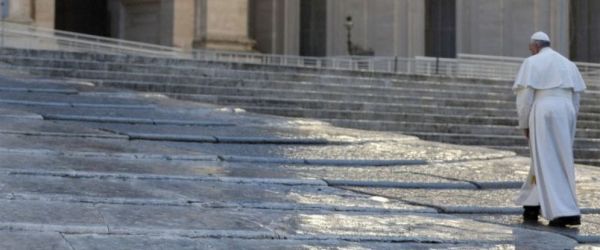In these days of Lent we have seen the persecution that Jesus suffered and how the doctors of the Law raged against him: he was judged under doggedness, with doggedness, being innocent. I would like to pray today for all the people who suffer an unjust sentence because of doggedness.
The prophecy of Isaiah that we have heard is a prophecy about the Messiah, about the Redeemer, but it is also a prophecy about the people of Israel, about the people of God: we can say that it can be a prophecy about each one of us. In essence, the prophecy emphasises that the Lord elected his servant from the womb: twice it says so (cf. Isaiah 49:1). From the beginning his servant was elected, from birth or before birth. God's people were chosen before they were born, even each one of us. None of us fell into the world by chance, by accident. Everyone has a destiny, has a free destiny, the destiny of God's election. I am born with the destiny of being a child of God, of being a servant of God, with the task of serving, of building, of edifying. And this, from the womb.
The Servant of Yahweh, Jesus, served until death: it seemed a defeat, but it was the way to serve. And this underlines the way of serving that we must take in our lives. To serve is to give oneself, to give oneself to others. To serve is not to expect any benefit for anyone other than serving. It is the glory, to serve; and the glory of Christ is to serve even to the point of annihilating himself, even to death, death on a cross (cf. Phil 2:8). Jesus is the servant of Israel. God's people are servants, and when God's people stray from this attitude of serving they are apostate people: they stray from the vocation God has given them. And when each of us turns away from this vocation to serve, we turn away from the love of God. And he builds his life on other loves, many times idolising.
The Lord elected us from the womb. There are, in life, falls: each of us is a sinner and can fall and has fallen. Only Our Lady and Jesus [are sinless]: all the rest of us are fallen, we are sinners. But what is important is the attitude before the God who has chosen me, who has anointed me as a servant; it is the attitude of a sinner who is able to ask for forgiveness, like Peter, who swears that "no, I will never deny you, Lord, never, never!", then, when the cock crows, he cries. He repents (cf. Mt 26:75). This is the way of the servant: when he slips, when he falls, ask for forgiveness.
On the other hand, when the servant is not able to understand that he has fallen, when the passion takes him in such a way that it leads him to idolatry, he opens his heart to Satan, he enters into the night: this is what happened to Judas (cf. Mt 27:3-10).
Let us think today of Jesus, the servant, faithful in service. His vocation is to serve, even unto death and death on a cross (cf. Phil 2:5-11). Let us think of each one of us, part of the people of God: we are servants, our vocation is to serve, not to take advantage of our place in the Church. Serve. Always in service.
We ask for the grace to persevere in service. Sometimes with slips, falls, but the grace at least to weep as Peter wept.
[Pope Francis, S. Marta homily 7 April 2020]












